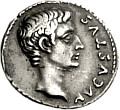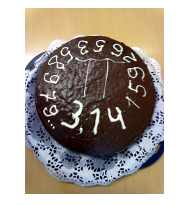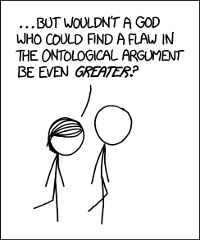
About this site
A philosophy site by Mark in Malaysia.My real interest is the mind-body problem and I’m gradually trying to figure out what I want to say about this.
Meanwhile, here’s some other stuff that I’ve found to be more tractable over the years, hard as they are in themselves.
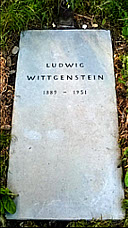 Wittgenstein’s grave in Cambridge receives more than a hundred visitors every year, not that there’s a contest.
Wittgenstein’s grave in Cambridge receives more than a hundred visitors every year, not that there’s a contest.I discovered philosophy when I was twenty-one and never looked back. Duck finally found water and I cannot even begin to describe what the subject did for me.
I also had many reliable teachers at all levels to whom I am very grateful. I hope that some people will find this site useful in return.
The ontological argument does not exist
 … it is necessary to admit that God exists, once I have supposed him to possess all perfections, since existence is one of these perfections …
… it is necessary to admit that God exists, once I have supposed him to possess all perfections, since existence is one of these perfections …
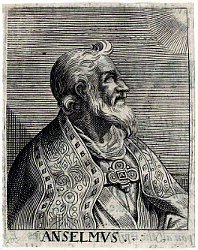 This venerable argument for God’s existence has been pored over for ages, but I have a small point to make concerning an unusual logical error that I seem to find in it, which I’ve never seen mentioned before.
This venerable argument for God’s existence has been pored over for ages, but I have a small point to make concerning an unusual logical error that I seem to find in it, which I’ve never seen mentioned before.
The ontological argument is beguiling because it’s both simple and perplexing. Sophisticated versions have been proposed over the ages, but the point I wish to make relates only to its bare-bones version, e.g., as expressed by Descartes above, which is perplexing enough. The argument’s original presentation by St. Anselm in the Proslogion turns out to have a comparable structure—on at least one common reading of it—and so my point will apply to it as well. But I’ll begin with Descartes’s version, which is slightly simpler. So then:
Russell himself expressed the argument as follows:
The reformulated argument is that a perfect being (‘God’) has to exist, on pain of contradiction. What contradiction? Well, if it did not exist, it would not be perfect.—Because existence is a perfection, or because it would be better for such a being to exist than not, or some such thing: the details won’t matter because I will be allowing this part of the argument to pass.—But the being in question was stipulated to be perfect. \( Q.E.D. \) In short:
So it is with the perfect being. Assuming that it does not exist, it follows indeed—let us grant—that it would have contradictory properties. It would be both perfect and imperfect, as explained above. But this contradiction is confined to the realm of the non-existent, as per our assumption, and so isn’t anything to be feared. Granted, if the perfect being did exist, there would be no contradiction. The contradiction only appears if the perfect being does not exist. But even the clearer then that this contradiction is fenced off from the actual world, and is not something that requires further action on our part to avoid. In particular, we aren’t compelled to avoid it by rejecting the assumption from which it flows and holding thereby that the perfect being must exist.
Assuming that so much is clear by way of a first pass, notice that the same may be said of St. Anselm’s presentation of the argument, which appears to proceed indeed as a proof by contradiction:
It should be clear that everything that I have said above applies to this common construal of Anselm’s argument as well.
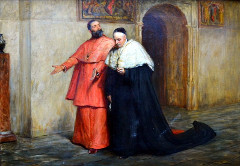

Reductio ad absurdum. Painting by John Pettie exhibited at the Royal Academy in 1884. See Wikimedia CommonsIf anything is more venerable than the ontological argument, it may be a proof by contradiction. If a supposition leads to a contradiction, then the supposition cannot be true—on pain of contradiction, as we say. But the painful contradiction should really be an actual one—i.e., given the supposition—something genuinely insufferable.
So the following would be a misuse of proof by contradiction. Of a certain, specified individual whose existence we are unsure of (say), we assume that it does not exist, and find ourselves able to deduce, on that basis, that it has contradictory properties. We then conclude that this individual must exist, on pain of contradiction. It seems to me that there is no such argument. This summarizes what I said above.
It may help to contrast this with a structurally identical proof, but which starts by assuming instead that the individual in question exists. Numerous examples are found in math. For instance, assume that the number of primes is finite, i.e., that the largest prime number exists. It then follows, by a series of well-known steps, that an even larger prime must exist.
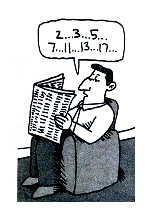 So the largest prime number is now both the largest, and yet not the largest prime number, i.e., has contradictory properties.
So the largest prime number is now both the largest, and yet not the largest prime number, i.e., has contradictory properties.
Here, we rightfully reject the initial assumption and conclude that the largest prime number does not exist, because the generated contradiction would otherwise lie in the realm of the existent, as per our assumption. So a proof with this sort of structure works if we start by assuming that the individual of interest exists, but not if we start by assuming that it does not exist.
The point should not be overstated. I’m not claiming that an existence-proof by contradiction is never possible. On the contrary, it is often possible to derive an unwelcome contradiction from the assumption that some given individual does not exist, thereby establishing that it does exist. But, in these cases, the unwelcome contradiction is never to the effect that the individual in question—assumed not to exist—has contradictory properties, but is rather a real contradiction, something in the actual world that shouldn’t be there.
To illustrate, here’s a simple proof by contradiction that there exists a digit that appears infinitely often in the decimal expansion of \( \pi \).
Likewise, the mathematician Paul Erdős famously proved that there exists a prime number between \( n \) and \( 2n, \) for any large positive integer \( n \), by showing that, on the assumption that there wasn’t, the middle binomial coefficient \( \binom{2n}{n} \)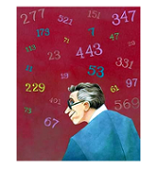 would be smaller than itself, which is a contradiction. \( Q.E.D. \)
would be smaller than itself, which is a contradiction. \( Q.E.D. \) 
Here again, the contradiction infects the extant quantity \( \binom{2n}{n} \) and not the hypothesized non-existent prime number between \( n \) and \( 2n. \)
I do not know of any example in math where an existence proof proceeds by demonstrating that a certain individual would have contradictory properties if we assumed that that very individual did not exist; therefore, it must exist. Should there be such a “proof,” I would think that it was invalid, for the reasons explained. Indeed, the only argument I know of that proceeds in this questionable manner is the ontological argument.
I mentioned at the start that the point is easier to see if the ontological argument is expressed as a reductio ad absurdum, or proof by contradiction. It has not always been formulated that way though. If run as a modus tollens, for example, the point is harder to see:
Take the last example shown. If you accept that God has all the perfections and that existence is a perfection, then you can deny the conclusion only on pain of contradiction. For to deny the conclusion is to say that God does not exist, and so lacks the perfection of existence, which contradicts the premise that he has all the perfections. So we are back to the proof by contradiction, and the reply, as before, is that it is harmless if God ends up saddled with contradictory properties, since the contradiction is confined—as per our denial of the conclusion—to the realm of the non-existent. So it doesn’t matter, in the end, whether the argument has the explicit form of a proof by contradiction.
 Nor does it matter if the contradiction is not generated within God’s properties themselves, but in a different place. Perhaps the contradiction is that if God does not exist, then existence has not to be a perfection, since God has all the perfections; but this contradicts the premise that existence is a perfection. This relocates the contradiction away from the nature of God onto the nature of existence, as it were. It is now existence, not God, that is saddled with contradictory properties. This may raise a concern, since the contradiction was supposed to be harmless only in virtue of being confined to the nature of God—was it not?
Nor does it matter if the contradiction is not generated within God’s properties themselves, but in a different place. Perhaps the contradiction is that if God does not exist, then existence has not to be a perfection, since God has all the perfections; but this contradicts the premise that existence is a perfection. This relocates the contradiction away from the nature of God onto the nature of existence, as it were. It is now existence, not God, that is saddled with contradictory properties. This may raise a concern, since the contradiction was supposed to be harmless only in virtue of being confined to the nature of God—was it not?
In fact, though, the contradiction is harmless wherever we put it. The crucial thing is not whether the contradiction is confined to the nature of God, but whether it intrudes into reality. It’s just easier to see that it does not do so, if we locate it within the nature of God. Thus, consider the relocated contradiction just suggested, that existence is not a perfection and yet is one. Notice that the negative claim is established by the counterexample of God, who has all the perfections, but doesn’t exist. But for this counterexample, there would be no contradiction. But then notice that God is a counterexample only if we suppose that he doesn’t exist. If he did exist, he would be no counterexample, because no existing object could contradict the positive claim that existence is a perfection; only a perfect object that didn’t exist could do so. So the counterexample, and its associated contradiction, only ever shows up when a non-existent object is at issue, and thus never intrudes into the real world. This is harder to see if the contradiction is relocated in the suggested way, but that is all.
 Sometimes, the contradiction is relocated simply by using the passive voice. In Anselm’s proof, for instance, on the supposition that God does not exist, some commentators find it natural to infer the following contradiction: that we’d now be able to think of a being greater than God, having already conceded that we are unable to think of a being greater than God. This locates the contradiction within our nature—what we are able or unable to do—and away from God’s nature. It should be clear, however, that this just expresses Anselm’s own contradiction in the passive voice. Anselm’s contradiction, which locates the contradiction squarely within God’s nature, was that God is a being greater than which some other can be thought, and yet a being greater than which no other can be thought. This sort of passive-voice relocation clearly makes no difference either.
Sometimes, the contradiction is relocated simply by using the passive voice. In Anselm’s proof, for instance, on the supposition that God does not exist, some commentators find it natural to infer the following contradiction: that we’d now be able to think of a being greater than God, having already conceded that we are unable to think of a being greater than God. This locates the contradiction within our nature—what we are able or unable to do—and away from God’s nature. It should be clear, however, that this just expresses Anselm’s own contradiction in the passive voice. Anselm’s contradiction, which locates the contradiction squarely within God’s nature, was that God is a being greater than which some other can be thought, and yet a being greater than which no other can be thought. This sort of passive-voice relocation clearly makes no difference either.
In general, I should say that the ontological argument may be faulted in the manner previously explained so long as the contradiction in question, regardless of where we happen to locate it, can be relocated within God’s properties if we so choose.
 Historically speaking, if anyone was well placed to resist the ontological argument in the manner suggested above, it would have been Alexius Meinong, who said things very similar to some of what I said above, though in a slightly different context.
Historically speaking, if anyone was well placed to resist the ontological argument in the manner suggested above, it would have been Alexius Meinong, who said things very similar to some of what I said above, though in a slightly different context.
Meinong was, at the time, fending off objections to his Theory of Objects

– Descartes, Fifth Meditation

The ontological argument is beguiling because it’s both simple and perplexing. Sophisticated versions have been proposed over the ages, but the point I wish to make relates only to its bare-bones version, e.g., as expressed by Descartes above, which is perplexing enough. The argument’s original presentation by St. Anselm in the Proslogion turns out to have a comparable structure—on at least one common reading of it—and so my point will apply to it as well. But I’ll begin with Descartes’s version, which is slightly simpler. So then:
Hardly anyone thinks that this audacious argument works, but people have different ideas of where it goes wrong. As Russell lamented, “it is easier to feel convinced that it must be fallacious than it is to find out precisely where the fallacy lies.”God possesses all perfections. Existence is a perfection. Hence, God exists.—Descartes, Fifth Meditation, as per the epigraph shown above. See Michael Moriarty’s 2008 translation of Descartes’s Meditations on First Philosophy (1641). Google books

—Russell, History of Western Philosophy (1949). See chapter 11 on Leibniz.
Russell himself expressed the argument as follows:
which is essentially Descartes’s formulation. But it will be easier to see what I wish to say about the argument if we express it as a proof by contradiction, so let’s first reformulate it in that way.The most perfect Being has all perfections. Existence is a perfection. Therefore, the most perfect Being exists.—Russell, ‘On Denoting,’ Mind, vol. 14 (1905), p. 491.
The reformulated argument is that a perfect being (‘God’) has to exist, on pain of contradiction. What contradiction? Well, if it did not exist, it would not be perfect.—Because existence is a perfection, or because it would be better for such a being to exist than not, or some such thing: the details won’t matter because I will be allowing this part of the argument to pass.—But the being in question was stipulated to be perfect. \( Q.E.D. \) In short:
This is where my point of contention comes in, for it seems to me that it’s not an issue for an individual to possess contradictory properties if that individual, ex hypothesi, does not exist. Or, somewhat more generally, if that individual is—for whatever reason—confined to the realm of the non-existent. Take the notorious round square, for instance, a contradictory individual if there ever was one. Its contradictory nature does not bother us because we understand that there cannot, in fact, be any such thing. The contradiction is fenced off from reality and never shows up in the actual world, the existing world. An actual contradiction would be anathema, because the real world, the actual world, should be free of contradiction, but if the contradiction stands no chance of being actualized, it doesn’t seem to me to be an issue.If a perfect being did not exist, it would be both perfect and imperfect, which is a contradiction. Hence, a perfect being must exist.
So it is with the perfect being. Assuming that it does not exist, it follows indeed—let us grant—that it would have contradictory properties. It would be both perfect and imperfect, as explained above. But this contradiction is confined to the realm of the non-existent, as per our assumption, and so isn’t anything to be feared. Granted, if the perfect being did exist, there would be no contradiction. The contradiction only appears if the perfect being does not exist. But even the clearer then that this contradiction is fenced off from the actual world, and is not something that requires further action on our part to avoid. In particular, we aren’t compelled to avoid it by rejecting the assumption from which it flows and holding thereby that the perfect being must exist.
⚹
Assuming that so much is clear by way of a first pass, notice that the same may be said of St. Anselm’s presentation of the argument, which appears to proceed indeed as a proof by contradiction:
I read this passage as follows, in common with many commentators, though, it must be said, not all.… And surely that than which a greater cannot be thought cannot exist only in the understanding. For if it exists only in the understanding, it can be thought to exist in reality as well, which is greater. So if that than which a greater cannot be thought exists only in the understanding, then the very thing than which a greater cannot be thought is something than which a greater can be thought. But that is clearly impossible. Therefore, there is no doubt that something than which a greater cannot be thought exists both in the understanding and in reality.—Anselm, Proslogion (c. 1078), chapter 2. See Monologion and Proslogion (Hackett 1996), trans. Thomas Williams.

Those who read the argument essentially as I do include Russell, History of Western Philosophy (1949), Chapter 9, and William L. Rowe, ‘The Ontological Argument and Question-Begging,’ International Journal for Philosophy of Religion, vol.7 (1976). Those who discern significantly more structure in it include G. E. M. Anscombe, ‘Why Anselm’s Proof in the Proslogion is not an Ontological Argument,’ Thoreau Quarterly, vol. 17 (1985), and Richard Campbell, ‘Anselm’s Three-Stage Argument: Twenty Years On,’ Sophia, vol. 34 (1995).
Anselm characterizes God as a being greater than which no other can be thought. He then contends that if God did not exist, an even greater being could be thought, namely, a being just like God, but which, in addition, existed. So God would now be a being greater than which some other can be thought, and yet, in essence, a being greater than which no other can be thought, i.e., would now have contradictory properties.It should be clear that everything that I have said above applies to this common construal of Anselm’s argument as well.
⚹


Reductio ad absurdum. Painting by John Pettie exhibited at the Royal Academy in 1884. See Wikimedia Commons
So the following would be a misuse of proof by contradiction. Of a certain, specified individual whose existence we are unsure of (say), we assume that it does not exist, and find ourselves able to deduce, on that basis, that it has contradictory properties. We then conclude that this individual must exist, on pain of contradiction. It seems to me that there is no such argument. This summarizes what I said above.
It may help to contrast this with a structurally identical proof, but which starts by assuming instead that the individual in question exists. Numerous examples are found in math. For instance, assume that the number of primes is finite, i.e., that the largest prime number exists. It then follows, by a series of well-known steps, that an even larger prime must exist.

Let \( p \) be the largest prime number, and consider the number:\[ q = (2 \times 3 \times 5 \times \cdots \times p) + 1 \]Since \( q \) has no prime factor, it must be a prime number, moreover one larger than \( p \).

Here, we rightfully reject the initial assumption and conclude that the largest prime number does not exist, because the generated contradiction would otherwise lie in the realm of the existent, as per our assumption. So a proof with this sort of structure works if we start by assuming that the individual of interest exists, but not if we start by assuming that it does not exist.
The point should not be overstated. I’m not claiming that an existence-proof by contradiction is never possible. On the contrary, it is often possible to derive an unwelcome contradiction from the assumption that some given individual does not exist, thereby establishing that it does exist. But, in these cases, the unwelcome contradiction is never to the effect that the individual in question—assumed not to exist—has contradictory properties, but is rather a real contradiction, something in the actual world that shouldn’t be there.
To illustrate, here’s a simple proof by contradiction that there exists a digit that appears infinitely often in the decimal expansion of \( \pi \).
Here, the dread contradiction has to do with \( \pi \) having contradictory properties—having an infinite decimal expansion, and yet only a finite one—and not with any of the hypothesized non-existent digits themselves having contradictory properties. This makes a difference because \( \pi \) certainly exists, so the contradiction cannot be ignored, and the initial assumption must be rejected.Assume that such a digit does not exist. The decimal expansion of \( \pi \) would then be finite, since each of \( 0-9 \) would appear only finitely often therein. But we know on independent grounds that the decimal expansion of \( \pi \) is infinite. \( Q.E.D. \)Author unknown. Proof has been claimed by the internet.
Likewise, the mathematician Paul Erdős famously proved that there exists a prime number between \( n \) and \( 2n, \) for any large positive integer \( n \), by showing that, on the assumption that there wasn’t, the middle binomial coefficient \( \binom{2n}{n} \)


For more on Erdős’s proof, see Jørgen Veisdal, ‘The Mathematical Nomad,’ at www.privatdozent.co.
Here again, the contradiction infects the extant quantity \( \binom{2n}{n} \) and not the hypothesized non-existent prime number between \( n \) and \( 2n. \)
I do not know of any example in math where an existence proof proceeds by demonstrating that a certain individual would have contradictory properties if we assumed that that very individual did not exist; therefore, it must exist. Should there be such a “proof,” I would think that it was invalid, for the reasons explained. Indeed, the only argument I know of that proceeds in this questionable manner is the ontological argument.
⚹
I mentioned at the start that the point is easier to see if the ontological argument is expressed as a reductio ad absurdum, or proof by contradiction. It has not always been formulated that way though. If run as a modus tollens, for example, the point is harder to see:
This looks like a valid argument and I’m allowing both of its premises, so am I not bound to accept the conclusion? Likewise, the point is all but obscured if the argument is formulated directly, in the manner of Descartes or Russell:God is the most perfect being. If God did not exist, he would not be the most perfect being. Therefore, God exists.
But the point remains, no matter how the argument is expressed, because deductive validity turns ultimately on the principle of non-contradiction. In a deductively valid argument, it would be a contradiction to accept the premises and deny the conclusion, which is why, having accepted the premises, you must (standardly) swallow the conclusion.God has all the perfections. Existence is a perfection. Therefore, God exists.
Take the last example shown. If you accept that God has all the perfections and that existence is a perfection, then you can deny the conclusion only on pain of contradiction. For to deny the conclusion is to say that God does not exist, and so lacks the perfection of existence, which contradicts the premise that he has all the perfections. So we are back to the proof by contradiction, and the reply, as before, is that it is harmless if God ends up saddled with contradictory properties, since the contradiction is confined—as per our denial of the conclusion—to the realm of the non-existent. So it doesn’t matter, in the end, whether the argument has the explicit form of a proof by contradiction.

In fact, though, the contradiction is harmless wherever we put it. The crucial thing is not whether the contradiction is confined to the nature of God, but whether it intrudes into reality. It’s just easier to see that it does not do so, if we locate it within the nature of God. Thus, consider the relocated contradiction just suggested, that existence is not a perfection and yet is one. Notice that the negative claim is established by the counterexample of God, who has all the perfections, but doesn’t exist. But for this counterexample, there would be no contradiction. But then notice that God is a counterexample only if we suppose that he doesn’t exist. If he did exist, he would be no counterexample, because no existing object could contradict the positive claim that existence is a perfection; only a perfect object that didn’t exist could do so. So the counterexample, and its associated contradiction, only ever shows up when a non-existent object is at issue, and thus never intrudes into the real world. This is harder to see if the contradiction is relocated in the suggested way, but that is all.

In general, I should say that the ontological argument may be faulted in the manner previously explained so long as the contradiction in question, regardless of where we happen to locate it, can be relocated within God’s properties if we so choose.
⚹

Meinong was, at the time, fending off objections to his Theory of Objects

—Meinong, ‘Über Gegenstandstheorie’ (1904), translated as ‘The Theory of Objects’ in Roderick M. Chisholm (ed.), Realism and the Background of Phenomenology (Free Press 1960).
that were being raised by Russell. One prominent objection was that some of Meinong’s “objects” were apt to violate the law of non-contradiction. Thus Russell:Meinong’s vigorous response to this charge is reported by Roderick Chisholm as follows:[Meinong’s] theory regards any grammatically correct denoting phrase as standing for an object. Thus “the present King of France,” “the round square,” etc., are supposed to be genuine objects. It is admitted that such objects do not subsist, but nevertheless they are supposed to be objects. This is in itself a difficult view; but the chief objection is that such objects, admittedly, are apt to infringe the law of contradiction. It is contended, for example, that the existent present King of France exists, and also does not exist; that the round square is round, and also not round; etc. But this is intolerable; and if any theory can be found to avoid this result, it is surely to be preferred.—Russell, ‘On Denoting,’ Mind, vol. 14 (1905), pp. 482-3.
Janet Farrell Smith, in her helpful commentary on the debate, characterizes Meinong’s stance in much the same way:Bertrand Russell had objected that if, as Meinong contends, “The round square is both round and square” is true, then the law of contradiction is violated; hence, Russell concluded, Meinong is mistaken in saying that the sentence is true. To this objection, Meinong replied by saying that the law of contradiction holds only of what exists, or is real, and is thus not violated by the sentence in question. To be sure, nothing that exists is both round and square; but we can hardly expect the law of contradiction to hold of objects, such as the round square, which cannot possibly exist.—Chisholm, ‘Editor’s Introduction,’ in Realism and the Background of Phenomenology (Free Press 1960), p. 10.
Meinong’s underlying reasoning here is that a contradiction resulting from an analytic judgment like [The round square is round and non-round] will not possess existential import; that is, there will be no existent (or subsistent) object possessing these characteristics. Further, there is no possibility of any existent object possessing these characteristics …… The Law of Noncontradiction was meant to apply to actuals and possibles, not to impossible objects.—Farrell Smith, ‘The Russell-Meinong Debate,’ Philosophy and Phenomenological Research, vol. 45 (1985), pp. 327 and 312, respectively.I do believe that Meinong wins this particular debate with Russell, and am happy to rely on Farrell Smith’s thorough discussion here. (She thinks the same.) And while there is obviously more to Meinong’s Theory of Objects than the brief explanation just given, even this tiny glimpse suffices to show that it was open to Meinong to resist the traditional ontological argument in the way that I have suggested, for he wards off Russell’s objection using essentially the same considerations that I used above to ward off the ontological argument. Unfortunately, Meinong seems nowhere to have discussed the traditional ontological argument at all, so it’s hard to be sure what he would have actually said about it.
One might think it too high a price to pay to resist the ontological argument if one would have to buy into anything like Meinong’s Theory of Objects to do so. That would be a bit like drawing a sword to kill a fly. But, no, this misunderstands the logic of the situation. To resist the argument in the way that I have suggested is really just to meet a proponent of the ontological argument on his own terms. By his own lights, we can apparently know a statement like, ‘God has all the perfections,’ to be true in advance of knowing whether or not God exists—indeed, even if, per impossible, God did not exist. So he appears to be supposing that the name ‘God’ refers to something independently of the question of whether God exists, much as Meinong would suppose a subject term like ‘the golden mountain’ or ‘the round square’ to refer to something, regardless of whether anything, in fact, answers to the description. The proponent of the argument is therefore committed to inflating his own ontology anyway, and if we now suggest to him, by way of defanging his proof by contradiction, that it does not matter if God has contradictory properties if God ex hypothesi does not exist, then we are merely playing him at his own game, exactly as if Meinong had conjured up the ontological argument for himself and then realized that, by his own principles, the argument did not work. It feels like a blessing from God, to be honest, to be able to meet the argument head on in this way.
⚹
The ontological argument is one of those arguments that you keep returning to every once in a while, reckoning that it has not quite been laid to rest to your own satisfaction yet.
The many analyses and refutations of the argument that I have seen over the years have often been interesting—even riveting—but, at the end of the day, somehow, less than completely satisfying.
A recurring objection, for example, has been that the argument begs the question where the use of a singular term like ‘God’ or ‘The most perfect being’ is concerned, the point being that a statement like, ‘God has all the perfections,’ cannot be considered to be true unless something, in fact, answers to the singular term.—So a proponent of the argument has to assume that God exists, whether or not he likes it, in order to get his argument rolling at all.
Another influential objection is the hallowed one that ‘exists’ is not a predicate, meaning something like that the argument illegitimately treats existence as a regular property like size or shape, whereas it’s a different kind of property altogether, followed by some explanation of what kind of property, then, it really is. This is often meant to impugn the premise that ‘Existence is a perfection,’ or whichever equivalent is employed in the argument.
A third, clever objection is that the argument is really of a kind with the following sort of sophism:followed by a precise unmasking of such sophistry, which turns out, incidentally, to be harder than it first looks.Let the expression, “God” mean “an almighty being who exists and is eternal.” Therefore, “God is an almighty being who exists and is eternal” is true by definition, and that entails “God exists.”
Each of these considerations—among others too numerous to mention—has been raised by a great many philosophers, often independently of each other. Yet none of them ever quite seems to subdue the argument completely, even in concert with one another.What one really wants is something that takes the argument by the scruff of its neck, as it were, and sends it on its way. This sort of thing can vary from one person to another, but the approach that I have suggested above appears to do it for me. Above all, as mentioned, it strikes me as meeting the argument squarely on its own ground. So the next time this classic conundrum comes up, my response will be unhesitating: where the ontological argument is concerned, you can’t have your contradiction and eat it.For a good discussion of all three of the foregoing considerations, see Jerome Shaffer, ‘Existence, Predication and the Ontological Argument,’ Mind, vol. 71 (1962).This much-cited paper may also be found in John Hick & Arthur C. McGill (eds.), The Many-Faced Argument, Macmillan (1967).Shaffer himself favours the third consideration; the sophism displayed above is his own.
July 2024
Addendum. Since writing this essay, I have discovered some passing remarks by Robert M. Adams that seem to hint at the strategy proposed above for resisting the ontological argument.
In his paper, ‘The Logical Structure of Anselm’s Arguments,’ Adams lays out the argument of Proslogion 2, and notes, as we did above, that Anselm has to inflate his ontology a little, à la Meinong, to get his argument started. Adams then observes:These remarks are essentially an invitation to us to ask—recalling the Russell-Meinong debate—if there is any reason why self-contradictory objects should be assumed by Anselm to be excluded from the universe of discourse?—apart from the need to prevent his reductio ad absurdum argument from collapsing, that is. Once the question is raised, and a negative answer contemplated, the strategy that I have proposed above for resisting the ontological argument comes naturally to mind.There is another respect in which Anselm is less liberal than Meinong. He clearly assumes that the universe of discourse includes no object with contradictory predicates, whereas Meinong admits such objects (for example, the round square). If it were not assumed that self-contradictory objects are excluded from the universe of discourse, Anselm’s reductio ad absurdum argument would collapse. For even if unreality and being a being than which a greater cannot be thought are inconsistent properties, it would not follow that the same object could not possess both.—Adams, ‘The Logical Structure of Anselm’s Arguments,’ Philosophical Review, vol. 80 (1971), p. 33.
Adams does not explicitly say that Anselm’s argument may be resisted in any such way. Nevertheless, in drawing attention to this particular assumption of Anselm’s, he implicitly anticipates the strategy in question. I do not know that Adams has expanded on these fleeting remarks in any of his subsequent work.
Menu
What’s a logical paradox?
Achilles & the tortoise
The surprise exam
Newcomb’s problem
Newcomb’s problem (sassy version)
Seeing and being
Logic test!
Philosophers say the strangest things
Favourite puzzles
Books on consciousness
Philosophy videos
Phinteresting
Philosopher biographies
Philosopher birthdays
Draft
barang 2009-2025  wayback machine
wayback machine
 wayback machine
wayback machine



